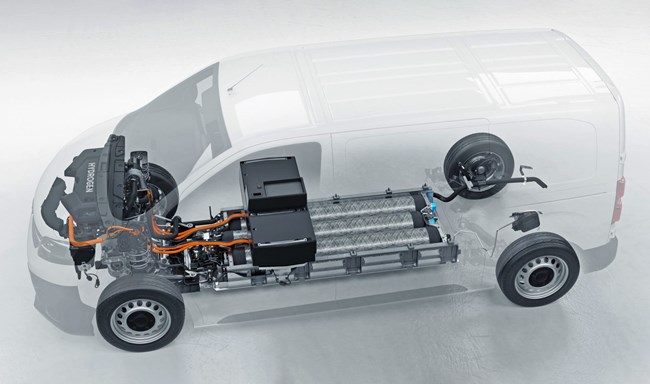- 'Luxury' tax on expensive pick-up trucks suggested
- ADVERTISEMENT FEATURE: Essential advice to avoid the van fleet ICE-berg
- ETRUX launches new Ford E-Transit Trizone
- Renault gives UK debut to Master E-Tech at CV Show
- Isuzu D-Max long-term test – Latest Report
- Isuzu D-Max V-Cross Steel Edition revealed
- IVOTY Report: Stellantis explores the hydrogen proposition
- New Maxus EVs include eDeliver 5 van
- Used LCV values reach six-month high
- ADVERTISEMENT FEATURE: IVECO Daily Mission Awards 2024 Q2 Round-up: Grounds Maintenance & Forestry
Hydrogen: Vauxhall sees opportunities for fuel cell vans
Date: Wednesday, May 31, 2023 | Author: Sean Keywood
The Stellantis brand says some operational requirements will remain beyond the reach of battery EVs.

Hydrogen vans will have a role to play in the move towards zero-emission fleets in some use cases where battery EVs are not suitable, according to Vauxhall.
The brand is the only part of the Stellantis group – alongside German sister brand Opel – which is planning to bring hydrogen fuel cell vehicles to market.
A hydrogen version of the Vivaro medium van went into commercial production from Opel in late-2021, and is also set to be brought to the UK for some fleet customers in left-hand drive form, before a future hydrogen large van arrives with right-hand drive.
Discussing the technology’s prospects at a Stellantis LCV event held for fleet customers, Stellantis LCV head of product and pricing Brad Miller said: “The government has tended to ringfence different segments of transportation, and as far as they are concerned cars and LCVs have got an EV solution, [whereas] HGV, buses, rail, aviation, maritime, you’ve got hydrogen. But it’s not quite as black and white as that.
“[With] LCVs, we know a number of use cases where EV is just not working, and hydrogen will help in some of those cases.”
Each model in Vauxhall’s van range is currently available as a battery electric variant, and Miller explained that those types of vehicles were still likely to be more in demand for future fleets.
He said: “EV is still the dominant solution. Fuel cell works in particular use cases and on a TCO argument, but where fleets can they will try and use EVs.”
Discussing potential advantages of hydrogen vans over EVs, Miller said: “Consistency of range – you don’t get the cold weather deterioration you experience with an EV, and filling time. For some fleets it’s a huge issue at the moment, the amount of time off road the vehicles have just to recharge them.
“In terms of benefits compared with diesel – actually, you would probably choose a diesel vehicle, but unfortunately the landscape we’re in means that you have no choice but to go to a zero-emission vehicle to meet the mandate.
“It does have similar range and refilling time, similar [type of] refuelling infrastructure, but it is a zero-emission vehicle with a quiet drive, and that is the landscape we’re in at the moment.”
The obvious current flaw with hydrogen van adoption is a lack of infrastructure, with the UK currently having just seven public hydrogen filling stations – and that number is set to soon reduce even further.
Miller predicted, based on supplier announcements, that this number would rise to between 200 and 250 by the end of the decade, but explained that fleets could also deploy depot-based hydrogen refuelling.
Although the already-available Vivaro is a medium van, Miller explained that large vans could offer better prospects for hydrogen, with a model in this segment set to go into production in left hand drive in late 2024, and in right hand drive early in 2025.
He said: “When we launched the [electric] medium van, [we found] 90% of diesel operational cycles would work with an EV. We’re estimating on a large van probably about 65%.
“Some of that gap will be [filled by] BEV with operational compromise, some will be fuel cell, and some of that there is no zero-emission solution.
“We are getting right-hand drive on the large van. At this stage, because of the way large vans operate as mainly depot to depot, we think it’s a better opportunity to start with.”
The event also featured updates on the future of the wider Stellantis van range, including 2024 model year updates for its compact, medium, and large vans.
For both the compact and medium vans, Stellantis product manager Craig Shuker said these would include front-end exterior styling tweaks, updated dashboards and steering wheel controls, improved infotainment, and upgrade safety systems, more of which would be available as standard. In addition, both ranges are set to gain more efficient electric powertrains.
As for the large vans, Shuker said the Citroen Relay, Peugeot Boxer, and Vauxhall Movano would move to be more in line with Fiat’s Ducato, with improved electric and diesel powertrains, and also adopting the Ducato’s infotainment and safety systems, including Level Two assisted driving.
View The WhatVan Digital Edition


